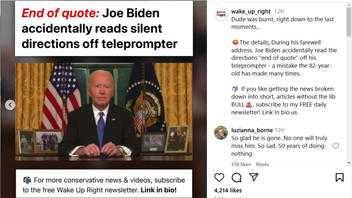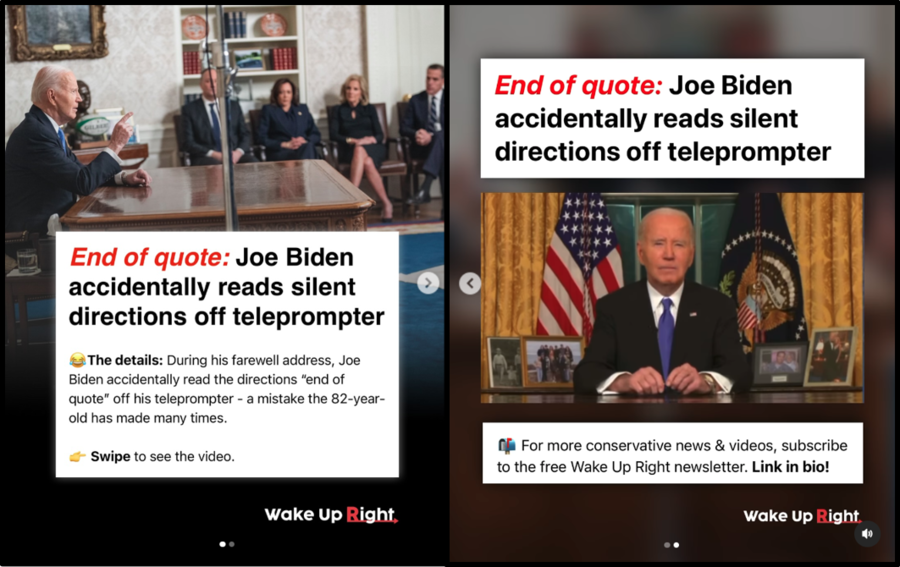
Did President Joe Biden err in saying "end of quote" during his farewell address on January 15, 2025, as some social media posts suggested? No, that's not true: Speakers often say "end of quote" to show they've finished quoting someone else. Biden has used this phrase in his speeches before to clarify things. Public speaking experts told Lead Stories that this is a common way for a speaker to attribute a quote to a source.
The claim appeared in a post and video (archived here) on Instagram on January 15, 2025, under the on-screen title "End of quote: Joe Biden accidentally reads silent directions off teleprompter." The post's caption said:
Dude was burnt, right down to the last moments...
😂The details: During his farewell address, Joe Biden accidentally read the directions 'end of quote' off his teleprompter - a mistake the 82-year-old has made many times.
This is what the two slides in the post looked like on Instagram at the time of writing:
(Source: Instagram screenshots taken on Thu Jan 16 2025 UTC)
This post provided no evidence to support the assertion that Joe Biden accidentally read the silent directions off the teleprompter rather than it being an intentional part of his remarks.
The video
Biden did indeed say "end of quote" during his "Farewell Address to the Nation" at the White House on January 15, 2025. The fact is confirmed by the six-second clip included in the social media post and by an official transcript (archived here) on the White House website. About halfway through his remarks, the president said (emphasis ours):
You know, his farewell address, President Eisenhower spoke of the dangers of the military-industrial complex. He warned us then about, and I quote, 'the potential for the disastrous rise of misplaced power,' end of quote.
Biden also said "and I quote" to begin the quote by Eisenhower to make clear where it began.
The clip on Instagram making the claim doesn't begin until the words "'the potential ...'"
Google search
Using Google Advanced Search on January 16, 2025, Lead Stories found the term "end of quote" (archived here) used dozens of times by the president in transcripts of his public comments. As noted before, Biden also often leads into the quotes of others with "and I quote."
Public speaking experts
A Lead Stories fact check from July 2, 2024, addressed the same claim about Biden saying "end of quote," that time in remarks about the Supreme Court's immunity ruling. For the fact check, Lead Stories spoke to three public speaking experts.
Matt McGarrity, founder and director of the Center for Speech & Debate at the University of Washington, told Lead Stories in a July 2, 2024, email that Biden's method of attribution -- saying "end of quote" -- is acceptable. He continued:
Language is pliant and I've heard people orally quote speech in a ton of ways. Written language deals really well with cited language because it can mark it graphically. Spoken language doesn't have the same tools. I personally hate finger air quotation marks, but it's really common. Largely a matter of style.
In a July 2, 2024, email to Lead Stories, Diana Leonard (archived here), director of public speaking at the University of Arizona's Department of Communication, said there's no problem with using "end of quote" when verbally quoting someone. She continued:
It is absolutely not wrong to say, '...and I quote...' or simply, 'quote', before you quote the material that is someone else's words; and then end with, 'end quote' or 'end of quote' or 'unquote' at the conclusion of the other's words.
A speaker can also choose to skip saying 'quote' and instead pause before changing their voice when quoting the material, and pause again when returning to their own material with their own natural voice.
One caveat however: in all circumstances, if you are specifically stating that this is a quote from someone else, it must be accurate, precisely repeated, and not taken out of context that might change the meaning of the quote.
Faber McAlister (archived here), coordinator of public speaking instruction at Drake University in Des Moines, Iowa, told Lead Stories in another July 2, 2024, email that Biden's style of public speaking is a "common way for a speaker to attribute a quote to another source to avoid plagiarism." McAlister added:
It can be difficult for a speaker to signal to an audience that words or phrases are not their own. This is why we hear speakers saying '...and I quote,' 'that was a direct quote,' 'end of quote' and so on. A written text has quotation marks and parentheses to attribute phrases to sources, but public speakers must translate these for a live audience.
Read more
Additional Lead Stories fact checks on claims involving Joe Biden can be found here.


















